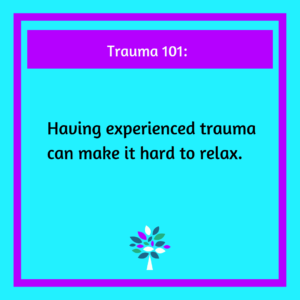Hard to relax

Having experienced trauma can make it hard to relax. This is because the fight/flight/freeze system is chronically activated.
Many trauma survivors find they are constantly on the lookout for danger, which we call hypervigilance. There is also often an increased startle response and difficulty unwinding enough to fall asleep.
This in turn can lead to unhealthy coping strategies such as drinking and substance use. But these only mask the problem. Learning how to help the body calm down is the long-term solution. This often involves physical strategies from yoga, to somatic experiencing work, and dance. Training the mind and body to work together through biofeedback, neurofeedback and heart rate variability training.
And of course, therapy is often a vital component to the work because it is the way we talk to ourselves (I am not safe) and the way we view the world (totally dangerous) that perpetuates the need to be on guard. If we don’t change these things then there will remain the need for vigilance. I find EMDR to be vital to helping my clients to make those needed cognitive changes.










